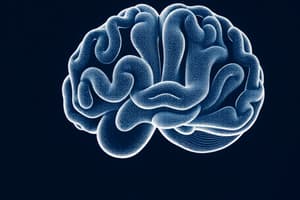Podcast
Questions and Answers
What is emotional intelligence?
What is emotional intelligence?
Emotional intelligence refers to the capacity to reflect and not just react in any given situation, encompassing the ability to identify, understand, and control one's own thoughts and feelings while empathizing with others.
Which of the following are components of emotional intelligence? (Select all that apply)
Which of the following are components of emotional intelligence? (Select all that apply)
- Emotional awareness (correct)
- Emotional literacy (correct)
- Emotional control (correct)
- Emotional distraction
People who experience feelings intensely usually express them appropriately.
People who experience feelings intensely usually express them appropriately.
False (B)
What influences the origin of emotions?
What influences the origin of emotions?
Emotions are forms of ____ in motion that serve as fuel for action.
Emotions are forms of ____ in motion that serve as fuel for action.
Which factors can affect how we interpret a given situation? (Select all that apply)
Which factors can affect how we interpret a given situation? (Select all that apply)
What are the two groups of people in relation to emotional intelligence?
What are the two groups of people in relation to emotional intelligence?
Poor emotional competency can lead to issues such as alcoholism and depression.
Poor emotional competency can lead to issues such as alcoholism and depression.
Flashcards are hidden until you start studying
Study Notes
Emotional Intelligence Overview
- Emotional intelligence (EI) varies from person to person and encompasses various forms of intelligence, including linguistic, logical-mathematical, musical, bodily-kinaesthetic, naturalistic, and personal (intrapersonal and interpersonal).
- Two main groups of individuals are often identified: those unaware of their feelings and unable to express them, and those who feel intensely yet express their feelings inappropriately.
Importance of Emotional Intelligence
- Developing emotional intelligence helps in coping with difficult emotional situations, fostering better communication and conflict-resolution skills.
- Lack of emotional proficiency may lead to issues such as low self-confidence, poor communication, troubled relationships, and various psychological issues like depression or substance abuse.
Defining Emotional Intelligence
- Goleman defines EI as the ability to reflect on emotions rather than merely react to them, considering it a vital skill for personal and social interaction.
- De Klerk describes it as the skill to identify, understand, and control personal thoughts and feelings, as well as empathize with others.
Key Components of Emotional Intelligence
- Emotional Awareness: Recognizing and understanding one’s own feelings and those of others.
- Emotional Literacy: Identifying and naming different feelings accurately.
- Emotional Control: Appropriately expressing and regulating feelings.
- Executive Function: Using emotional information to guide thoughts and actions effectively.
- Communication: Listening empathetically and conveying emotions clearly.
Emotions Explained
- Origin of Emotions: Influenced by inherited DNA and socialization experiences; emotional development stems from perceiving information through the senses and interpreting it through personal values and past experiences.
- Nature of Emotions: Emotions are internal physiological responses, considered energies that motivate actions and are inherent to human experience. Feelings can arise from both conscious thoughts and subconscious beliefs.
Significance of Emotional Intelligence
- Understanding emotional concepts is crucial for personal growth, well-being, and academic development.
- Strategies for enhancing emotional intelligence can be applied in both personal and academic contexts, contributing to a more effective engagement with emotions and social interactions.
Studying That Suits You
Use AI to generate personalized quizzes and flashcards to suit your learning preferences.




